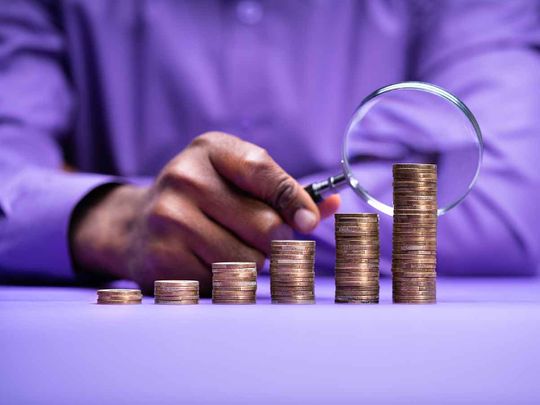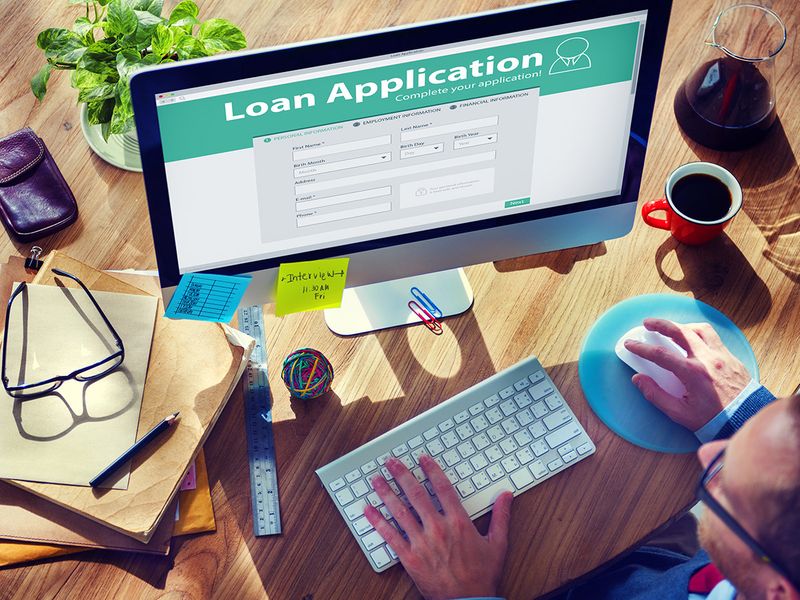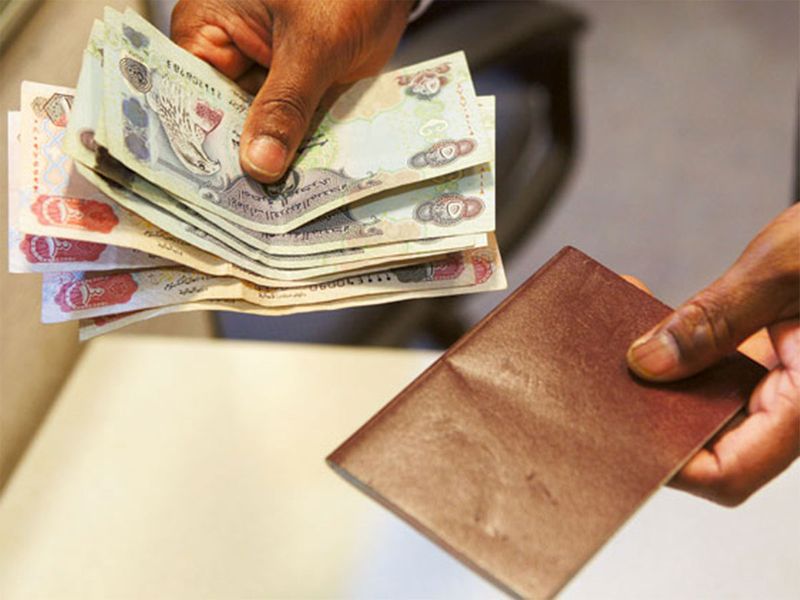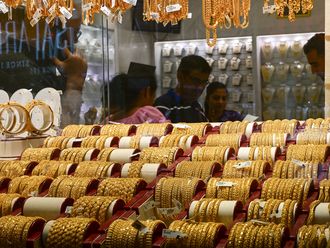
You'll often hear that investing your money is a great way to grow wealth and meet your financial goals. But what if you're short on cash and instead you borrowed money via a personal loan and use it to buy stocks or maybe even deposit the money in a savings account as fixed deposits.
A personal loan lets you borrow money for any reason, so once you have that money in your pocket, you can use it as you please. But is taking out a personal loan and investing that money a good idea? Let’s weigh the risks and perks.
“The interest rate for a personal loan will vary based on the specific lender you use and how strong an applicant you are,” noted Dubai-based debt restructuring and financial planning consultant Rupesh Naish, who went on to explain how you can benefit from investing the money you borrow.
“If you have a very high credit score, you might snag a competitive interest rate on the sum you borrow. And in that case, you may be able to invest or put that money in a savings account that generates a higher return on it than the amount of interest you're charged. If so, you'd come out ahead financially.”
If you snag a competitive interest rate on the sum you borrow, you may be able to deposit that money at a higher return on it than the amount of interest you're charged, and then you'd come out ahead financially
How it can affect you when borrowing to invest
For example, with good credit, you might qualify for a personal loan at 6 per cent interest. If you invest your money in a way that delivers a 10 per cent return, you'll earn more money than what you're being charged in interest on the loan. But here’s the most important risk Naish warned of when doing so.
“While the potential to come out ahead in that situation exists, for the most part, taking out a personal loan to start investing isn't a great idea, unless you can guarantee the high enough returns [like with a higher rate fixed-rate deposit] to make up for the interest you have to pay on a personal loan.”
“Instead, if you plan to invest the money in an ever-fluctuating stock market, even if you are a seasoned investor who's been buying stocks for years, there's no guarantee your portfolio will deliver high enough returns to surpass the interest rate you're paying on a personal loan,” Naish further cautioned.
The stock market could have a bumpy year, or a handful of the stocks you buy could underperform. For instance, if you take out a personal loan at 6 per cent but only manage a 5 per cent return in your portfolio, you'll end up losing money.

Key benefit: Loan flexibility, low interest rates
Personal loans are very flexible, and some charge pretty low interest rates. But remember, a personal loan is still a loan, and you'll have to pay it back no matter what you use that money for. If you invest your personal loan and lose money in the process, you'll still be on the hook for that loan balance.
“As a general rule, it's not a great idea to borrow money to invest with. Instead, work on cutting back on some spending or boosting your income with a side hustle. Then you can use that cash to start building an investment portfolio,” recommended Naish.
“The reality is that while saving is the safer route because the dirham amount in your bank account won’t typically decrease unless you withdraw funds, interest rates on savings accounts don’t allow your money to grow very quickly either.”
The reality is that while saving is the safer route, interest rates on savings accounts don’t allow your money to grow very quickly either
Key risk: Saving rates are often lower than rate of inflation
Unfortunately, interest rates on savings accounts are often lower than the rate of inflation. While this means your savings could lose purchasing power over time, it also means that savings rates often fall below the personal loan rates that are currently offered.
“While it’s tempting to want to invest to receive higher returns and beat inflation, unfortunately, the value of your investments won’t always go up as high as loan rates,” said Ebin Wilson, a Dubai-based banking analyst working at a global research and advisory firm.
“But there have been instances where banks give competitively higher rates, and let’s say a bank offers a personal loan at a competitive 5 per cent interest for two years, and you lock the money as a fixed deposit which earns you like 6 per cent over five years, you would still benefit at the end of the term.”

Savings rate should be higher than borrowing rates
To put it simply, the bigger the interest rate difference between your savings and respective loan rates, the benefits grow as well. It is only a matter of finding a savings rate that is higher than the rate of borrowing you plan on being incurred with.
“So when it comes to borrowing money for the sole purpose of investing, which is again a popular trend, the only time it makes sense to borrow money for an investment is when the return on investment of the loan is high and the risk level of the investment is low,” reiterated Wilson.
“Also, another risk is that if an investor takes out a loan it does not make sense to place the money in an investment that will mature after the loan is due. It is also important that the investor makes sure that the return on investment is greater than the cost of the loan.”
Lock up borrowed funds in savings or invest it instead?
There are plenty of benefits to saving your money in as fixed deposits (FDs) rather than investing it in the market. First, the dirham amount you save in a savings account won’t decrease over time. This is important because some goals need to happen regardless of whether investment prices are up or down.
“Saving rather than investing also allows you to reach your goal on time as long as you save the proper amount each month. Take the total you need to save and divide it by the number of months until you need to reach your goal to find the amount you need to save each month,” added Naish.
“Saving does have downsides though. Due to inflation, the money you save will decrease in value each year. If you earn interest, that interest may partially offset the negative effect of inflation. Unfortunately, interest rates rarely keep up with the rate of inflation.”

Both saving and investing the borrowed money has its risks
Moreover, if you’re only earning 5 per cent interest in a savings account but could earn an 7 per cent return investing, you’ll have to make up for that difference by investing some of the borrowed money (which was, as mentioned earlier, lent to you at 6 per cent) in order to reach your goal at the same time.
“Investing the borrowed money can be beneficial, too. Investing gives your money the potential to grow faster than it could in any savings account. If you have a long time until you need to meet your goal and willing to handle more risk, your returns will compound,” added Wilson.
“Basically, this means in addition to a higher rate of return on investments, your investment earnings will also earn money over time. The benefit of higher compounding returns is you won’t have to invest as much each month as you would need to save each month to reach your goal.”
However, like Naish, Wilson too cautioned that with investments, prices could go down and if this happens, you will have to either settle for an option that doesn’t cost as much, delay your goal until you can save more money or delay your goal until your investments increase in value.

The benefit of higher compounding returns is you won’t have to invest as much each month as you would need to save each month to reach your goal
Bottom line?
While many still do make a profit on borrowed money, they do it by putting it at risk, such as using it to buy stocks or real estate. ‘Risk’ here means that you could lose some or all of it, too, and you would still have the loan to pay off. If instead you put the money in a low-risk FD, there are other risks to factor.
Let’s say, as an expat, you take a loan from my home country for 5 per cent and deposit it in a savings account for 8 per cent in another country’s bank. If you do the problem is the currency rate fluctuates widely. Let’s assume the currency rate of the country in which you deposit devalues by 3.5 per cent.
You will the get only 4 per cent interest equivalent in your home country if the currency value drops during the time your savings is deposited. If the depreciation exceeds, you will lose further, with lower interest income on your deposit, and higher interest cost on the loan in the home country.

Add to this, the interest income from the another country will be subjected to tax there, which will also depress the apparent attractiveness of the spread of higher interest on deposits in another country over lower interest on loan from home country.
Also, the reality is finding a low-risk high-return FD is pretty difficult, as banks make their profits on the difference between what they pay on savings and what they charge on loans. You would then have to find one bank that pays a lot more on savings than the first bank is charging on loans.
So everything comes down to risk. If you have a very low interest loan and a very high interest savings account then it might look like you can make a profit. However, your profits are also conditional on a number of unforeseeable factors like currency devaluations, tax and guaranteeing assured returns.








